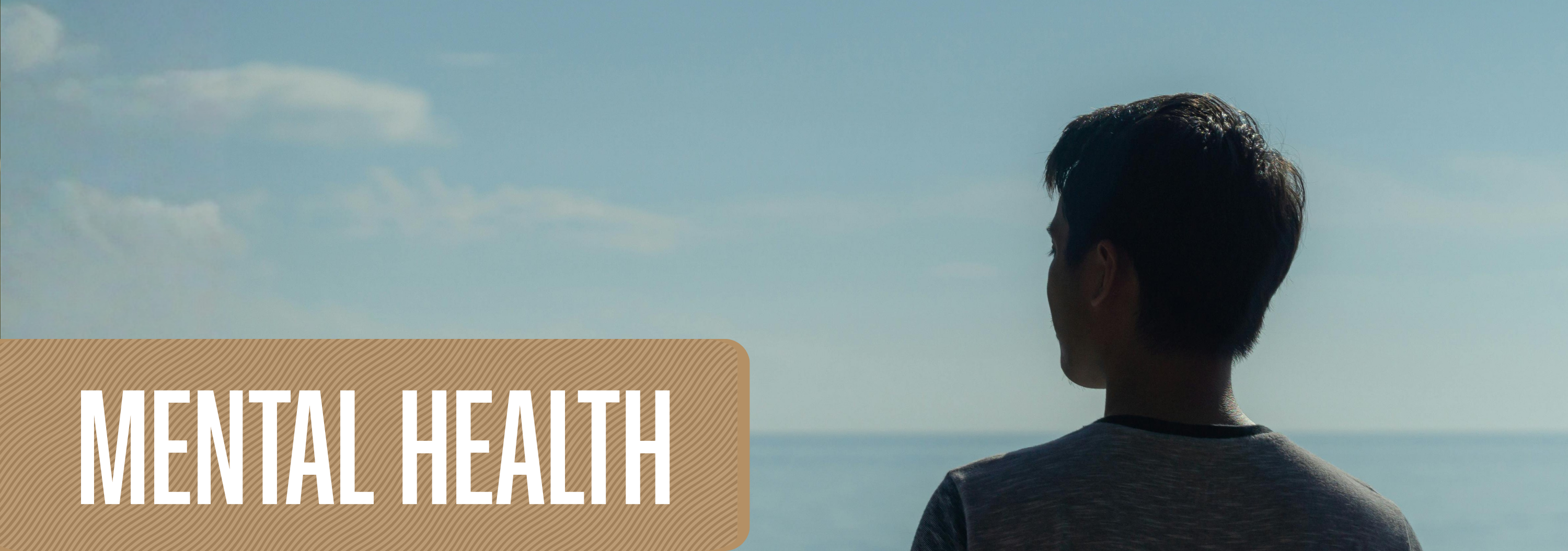

Supporting your mental and emotional wellbeing starts with having the right tools at hand. Below, you’ll find resources that can help you navigate stress, strengthen self-compassion, and recognize when additional support may be needed.
In this section:
- Stress Management
- Mindful Self-Compassion
- Suicide Prevention
Stress Management
Within the last 12 months, 29.4% of Stan State students reported stress as the number one factor affecting their individual academic performance.*
*Factors affecting academic performance were defined as: received a lower grade on an exam or an important project; received a lower grade in the course; received an incomplete or dropped the course; or experienced a significant disruption in thesis, dissertation, research, or practicum work (ACHA-NCHA II).
Managing Stress
According to the Centers for Disease Control and Prevention (CDC), stress is a condition that is often characterized by symptoms of physical or emotional tension. It is a reaction to a situation where a person feels threatened or anxious. Stress can be positive (starting a new job); known as eustress. Stress can also be negative (financial problems); known as distress. Negative stress can be harmful when it is severe enough to make you feel overwhelmed and unable to manage.
Physical or emotional tension are often signs of stress. They can be reactions to a situation that causes you to feel threatened or anxious. Other common symptoms include:
- Disbelief and shock
- Tension and irritability
- Fear and anxiety about the future
- Difficulty making decisions
- Feeling numb
- Loss of interest in normal activities
- Loss of appetite
- Anger
- Increased use of alcohol and/or drugs
- Feeling powerless
- Crying
- Sleep problems
- Headaches, back pain, and stomach problems
- Trouble concentrating
- Sadness and other symptoms of depression
- Find support
- Seek help from a partner, family member, friend, counselor, doctor, etc. Having a sympathetic, listening ear and sharing about your problems and stress can really lighten the burden.
- Connect socially
- It can be easy to isolate yourself when you’re feeling stressed. Make sure that you are spending time with loved ones. Consider planning fun activities with your friends, partner, or family.
- It can be easy to isolate yourself when you’re feeling stressed. Make sure that you are spending time with loved ones. Consider planning fun activities with your friends, partner, or family.
- Avoid drugs and alcohol
- They may seem to be a temporary fix to feel better, but in the long run they can create more problems and add to your stress – instead of take it away.
- They may seem to be a temporary fix to feel better, but in the long run they can create more problems and add to your stress – instead of take it away.
- Take care of yourself
- Eat a healthy, well-balanced diet. A proper diet can counterbalance the impact of stress by strengthening your immune system and stabilizing your mood.
- Exercise regularly. Exercise is effective at reducing fatigue and enhancing your overall cognitive function.
- Get plenty of sleep. Sleep allows our brains to recharge and our bodies to rest.
- Give yourself a break if you feel stressed out – for example, treat yourself to a therapeutic massage.
- Maintain a normal routine.
- Develop a “de-stress toolbox”
- Create a list of healthy ways to de-stress and recharge. Try to implement one idea each day, even when you’re feeling good! Some ideas include:
- Go for a walk
- Call a good friend
- Sweat-out tension with a workout
- Write in your journal
- Take a long bath
- Light scented candles
- Play with a pet
- Curl up with a good book
- Get a massage
- Listen to music
- Watch a comedy
- Create a list of healthy ways to de-stress and recharge. Try to implement one idea each day, even when you’re feeling good! Some ideas include:
- Stan State Student Health Center (209) 667-3396
- Counseling and Psychological Services (209) 667-3381
- Stan State Campus Recreation (209) 667-3705
- The American Institute of Stress
- HelpGuide.org has more information on coping with stress
- Centers for Disease Control and Prevention has more information on coping with stress
- The American Psychological Association has more information on recognizing stress and what you can do
- For more information and resources related to mental health, visit the PEER Project website
Mindful Self-Compassion
This resource library, created by our PEER Project student interns, will walk you through Dr. Kristin Neff’s and Dr. Christopher Germer’s Mindful Self-Compassion workbook. Mindful Self-Compassion is a proven way to accept yourself, build inner strength, and thrive. In this resource library, we’ve highlighted key concepts as well as ways in which you can incorporate mindful self-compassion in your life through daily practice.
What is Self-Compassion?
In this section, we introduce the three elements of self-compassion: mindfulness, self-kindness, and common humanity; dispel some common misconceptions and highlight the benefits of mindful self-compassion.
Self-Compassion (Accessible Version)
- Self-compassion is a practice and includes mindfulness, common humanity and self-kindness.
- Self-compassion involves becoming aware of your emotions, feelings, and patterns while also accepting them.
- Self-compassion tells us what we are experiencing is okay, as it is a part of humanity to experience the ups and downs; we are not alone in our struggles.
- Self-compassion emphasizes becoming an ally with yourself instead of an enemy. It allows you to treat yourself the way you would treat someone you care about, or someone who shares with you a challenging time they are going through.
- This information is adapted from the Mindful Self-Compassion Workbook written by Kristin Neff, PhD and Christopher Germer, PhD. This infographic was created Vanessa Sandoval, MSW Intern for the Health Education & Promotion Office at Stanislaus State.
Mindfulness (Accessible Version)
Listen to Audio:
Mindfulness | Practicing Mindfulness - A Student Perspective
- Mindfulness is an essential component of self-compassion, as it is the first step we need to take in order to be self-compassionate.
- Mindfulness involves being open to the reality of the present moment by allowing all thoughts, emotions and sensations without resistance to or avoidance.
- Mindfulness is an essential component of self-compassion because we need to be able to “feel it to heal it.” This means we must acknowledge when we’re suffering and set with our pain long enough to respond with care and kindness.
- Mindfulness is the first step of self-compassion as we need to be present with our thoughts. This allows us to respond in a way that avoids drowning ourselves in our sorrows and getting away with negative reactions.
- This information is adapted from the Mindful Self-Compassion Workbook written by Kristin Neff, PhD and Christopher Germer, PhD. This infographic was created Yolanda Verduzco, MSW Intern for the Health Education & Promotion Office at Stanislaus State.
Self-Kindness (Accessible Version)
- Self-kindness is one of the three elements of self-compassion
- Self-kindness is allowing you to comfort yourself, provide yourself with unconditional love and acceptance, and be there for yourself
- Take a second to notice when you are being self-critical, putting yourself down for any shortcomings or mistakes, and instead say to yourself what you would say to a good friend who was experiencing the same thing.
- This information is adapted from the Mindful Self-Compassion Workbook written by Kristin Neff, PhD and Christopher Germer, PhD. This infographic was created Vanessa Sandoval, MSW Intern for the Health Education & Promotion Office at Stanislaus State.
Common Humanity (Accessible Version)
- Common humanity is one of the three elements of self-compassion.
- No one is perfect. Suffering is a natural and normal part of the shared human experience. This is a part of our common humanity.
- All humans have flaws. We all make mistakes and we all encounter difficult feelings. It’s easy to get down on yourself with these feelings arise, but remember, life entails suffering, for everyone, without exception.
- You are not alone. Negative thoughts and experiences are not a result of something you lack. There is nothing wrong with you, life is just hard sometimes.
- This information is adapted from the Mindful Self-Compassion Workbook written by Kristin Neff, PhD and Christopher Germer, PhD. This infographic was created Mandy Schloss, MSW Intern for the Health Education & Promotion Office at Stanislaus State.
Benefits of Mindful Self-Compassion (Accessible Version)
- People who are more self-compassionate experience less depression, anxiety, stress and shame while also experiencing more happiness, life satisfaction, self-confidence and greater physical health.
- Self-compassion can be learned. You can learn to be more mindful and compassionate toward yourself. It requires practice just like any other skill, but it can radically transform the way you relate to yourself, and by doing so, radically transform your life.
- This information is adapted from the Mindful Self-Compassion Workbook written by Kristin Neff, PhD and Christopher Germer, PhD. This infographic was created Mandy Schloss, MSW Intern for the Health Education & Promotion Office at Stanislaus State.
Misconceptions of Self-Compassion (Accessible Version)
- “Self-compassion is a form of self-pity.” This is a misconception. Self-compassionate people accept and understand that life will throw everyone curve balls. While self-pity emphasizes a “poor me” attitude, self-compassionate individuals recognize that things happen to everyone so the least you can do is be kind to yourself while working through obstacles.
- “Self-compassion means weakness.” This is a misconception. A lot of us feel we have to be strong and not allow our natural human emotions to get the best of us. Self-compassion is actually one of the most powerful and beneficial sources of resilience and coping available to us.
- “Self-compassion is narcissistic.” This is a misconception. Self-compassion is not the same as self-esteem. Self-esteem is an evaluation of self-worth while self-compassion is having overall acceptance and kindness for yourself.
- “Self-compassion is selfish.” This is a misconception. The relationship you have with yourself is very important as it will play a role with the relationships you have with others. In order to be able to care for others and demonstrate compassion towards them, it is important to are for yourself and show yourself the same love you give to others. Studies show self-compassionate people are more caring and supportive in their relationships.
- This information is adapted from the Mindful Self-Compassion Workbook written by Kristin Neff, PhD and Christopher Germer, PhD. This infographic was created Vanessa Sandoval, MSW Intern for the Health Education & Promotion Office at Stanislaus State.
Suicide Prevention
Suicide prevention begins with awareness and knowing where to turn for help. Learn about resources that can help you recognize warning signs, start meaningful conversations and access professional support for yourself or someone you’re concerned about. You’re not alone and support is always available.
Identifying and Responding to Risk
- Approximately 1,350 college students die by suicide each year, about 3 per day.
- Research consistently reports that distressed college students first turn to friends for help.
- 52% of students who confided in others about their suicidal ideation reported that telling the first person was helpful or very helpful in dealing with suicide thoughts.
- Males are three times more likely to die by suicide than females, but women attempt suicide at rates two to three times the rate of males.
- Male veterans are twice as likely to die by suicide as the general male population.
- Lesbian, gay, and bisexual individuals, particularly adolescents and youth, have significantly higher rates for suicidal behavior.
- Each suicide seriously impacts at least six other people.
- It is estimated that nearly two-thirds of those who have significant mental health problems do not seek treatment because of fears of stigma and discrimination.
- Untreated mental illnesses - specifically depression, bipolar disorder, schizophrenia, and substance abuse - are the leading contributory causes of suicide in young adults.
- Studies show that nearly 1 in 5 individuals in California report needing help with a mental or emotional health problem.
- Only about one-quarter of young adults between the ages of 18-24 believe that a person with mental illness can eventually recover.
- Only a little more than one-half (54%) of young adults who know someone with a mental illness believe that treatment can help people with mental illnesses lead normal lives.
- Threatening to hurt or kill oneself or talking about wanting to hurt or kill oneself
- Looking for ways to kill oneself by seeking access to firearms, available pills, or other means
- Talking or writing about death, dying, or suicide when these actions are out of the ordinary for the person
- Feeling rage or uncontrolled anger or seeking revenge
- Acting reckless or engaging in risky activities - seemingly without thinking
- Feeling trapped - like there's no way out
- Increasing alcohol or drug use
- Withdrawing from friends, family, and society
- Feeling anxious, agitated, or unable to sleep or sleeping all the time
- Experiencing dramatic mood changes
- Seeing no reason for living or having no sense of purpose in life
- Be supportive, not dismissive.
- Know your limits. If you are talking with someone who has specific ideas about
how they would end their life, connect them with a COUNSELING CENTER. - Know your resources.
- Stan State Counseling and Psychological Services (209-667-3381)
- National Suicide Prevention Lifeline (1-800-273-8255)
- Get support - don't do it alone. If you talk with someone about their suicidal
thinking, it's important for you to talk to someone else. Ideally, that person has some
experience dealing with challenging topics, so that they can be supportive of you.
Video Links:
- Kari was a student-athlete at Fresno State who completed suicide in January of 1996. Her story lives on in hopes of promoting awareness about depression and how to help save a life.
- Kevin Hines is a global speaker, author and mental health advocate who reaches audiences with his story of an unlikely survival after he attempted to take his own life by jumping from the Golden Gate Bridge.
- Counseling and Psychological Services: 209-667-3381
- Student Health Center: 209-667-3396
- For any emergency, call 911 immediately.
- National Suicide Prevention Lifeline: 1-800-273-8255 (TALK)
- Stanislaus State University crisis alerts: 1-877-782-6411 (STAN-411)
- 24-hr. Rape Crisis Line: 209-527-5558
- Community Emergency Response Team: 209-558-4600
24 Hour Response to Urgent Personal Issues
- Hospital 24-hr. Emergency Service
- Emanuel Medical Center, Turlock: 209-667-4200
- Memorial Medical Center, Modesto: 209-572-7251
- Doctors Medical Center, Modesto: 209-578-1211
- Doctors Behavioral Health Center, Modesto: 209-557-6300
Counseling & Psychological Services (CAPS) provides professional, ethical and confidential psychological counseling to students.
CAPS hosts group sessions and wellness workshops designed to support student well-being and build healthy habits.
StanCares provides coordinated support and timely interventions to address student needs.
Updated: January 15, 2026


